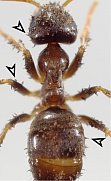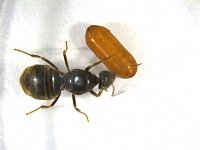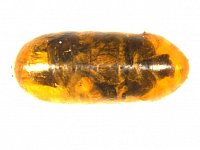Research
Our little group is engaged in several different projects relating to host-microbe interactions along the full spectrum of symbiotic relationships from parasitic to beneficial.
Microbial selection and control in group-living animals
Animals continuously encounter microorganisms that are essential for health or cause disease. Ants of the subfamily Formicinae, i.e. those with formic acid as the main component of their venom gland, do not only use their venom as defensive and offensive weapon but also as an external immune defence trait.

With the help of a research grant by the Ethologische Gesellschaft e.V. we are currently establishing a pH measurement system that will allow us to automatically track the use of venom gland secretions through space and time.

In collaboration with Timo Niedermeyer and the help of our joint PhD student Lukas Koch we are currently also elucidating the function, origin, and identity of peptides contained in formic acid dominated venoms.
Emerging infectious diseases
We are currently also disentangling aspects of disease emergence in two different host-parasite systems, involving invasive host species and bee pollinators respectively.

In collaboration with Bernard Kaufmann , we are investigating the impact and consequences of an emerging host-parasite association between the invasive garden ant Lasius neglectus and the likely equally invasive ectoparasitic fungus Laboulbenia formicarum in Europe.

In collaboration with Robert Paxton, Oliver Schweiger , and our post-doc Pina Brinker we are investigating the role of the gut microbiota in viral spill over from honeybees to wild bees in interaction with pesticide use in agriculture, a project funded by the state Saxony-Anhalt to support integrative Biodiversity Research between the Martin-Luther University Halle Wittenberg and the Centre for Integrative Biodiversity Research, iDiv (MLU|BioDivFund).
A neglected host-parasite association


Finally, since years, in collaboration with Oliver Otti and his family, Pina Brinker, Thomas Schmitt , Zsolt Karpati , Adrian Richter , Kenny Jandausch , Brendon Boudinot , and ant collectors from all over Europe we are investigating the life-history, cuticular hydrocarbon profile, prevalence and morphological and behavioural host changes in a so far barely described host-parasite association between L. niger ant queens and the dipteran parasitoid Strongygaster globula.




